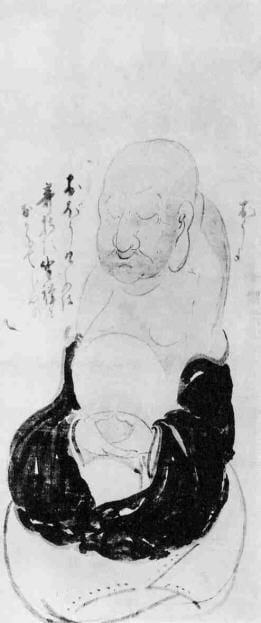So. What is Zen meditation?
We know it is the practice of a Buddhist spiritual tradition that, while it claims Indian roots, seems to have sprung up within the rich soil of ancient China. It has spread and has adapted variations in Vietnam, Korea, and Japan. And from these different places, it has begun to spread to the West.
What we can say is that it is not Vipassana, nor is it Samatha. Although it shares some family resemblances.
I usually summarize Zen meditation as a practice of intimacy. When giving basic instructions I say sit down, shut up, pay attention. When someone wants a little more, I suggest spending. year or two or three counting the breath. Following the tradition as I was taught it, I use one of the simpler versions, suggesting counting one on the first observed inhalation, two on the exhalation, three on the next inhalation, repeating the process until hitting ten. Then starting over.
At some point I think it good to drop the counting, and, well, just sit. In recent years within that just sitting I’ve suggested experimenting with an extended out breath, which has become part of my practice in my dotage.
Of course it can be said in fewer words. Or, if you like, more.
Just sit.
Zazen. Seated Zen.
And if we drop the sitting, then its just Zen.
This calls me to something I just read on one of the Facebook Zen pages. Someone cited the wonderful teacher Norman Fischer’s Mountains and Rivers Sutra, where he says:
“When the Chinese encountered the word ‘dhyana’, the Pali word for meditation, they translated it into something that sounded like ‘dhyana’ in Chinese. They chose the word ‘Chan’ which became ‘zen’ in Japan. But ‘Chan’ or ‘zen’ doesn’t mean meditation, it only sounds like the Pali word that means meditation. The literal meaning of ‘Chan’ is ‘to bow before mountains and rivers.’”
He, the citer, then asked if anyone could verify that definition for the word. This opened quite the range of comments. Mostly of the posturing sort. That old standard with a couple of amateur Zen masters sneering about the inferiority of dualistic thought, of course. Another offered a view of whether the word dhyana is Sanskrit or Pali, certain this was particularly meaningful, rather than a small correction. Others were more serious.
As sometimes happens out there in the inter webs one commentator seemed to actually know what he was talking about. Nelson Ho, I know nothing about him other than he brought what seemed pretty deep knowledge of Chinese along with just a hint of exasperation to the thread. He suggested the word Chan which was picked up in Chinese because it sounded like the Sanskrit, means “worshipping the Heaven.” He continued to dig and found a very early use where it means “making sacrifice to the Earth.” In conclusion Mr Ho suggested there was no natural connection to “mountains and rivers.”
The Venerable Fischer is a poet. He is also a practitioner of the discipline. And a teacher of our intimate way.
And wherever he picked up that “The literal meaning of ‘Chan’ is ‘to bow before mountains and rivers’” I personally find a connection between worshiping Heaven, Sacrificing to the Earth, and bowing to the Mountains and Rivers, and just sitting.
So, my take away from this?
What is Zen meditation?
Our teacher Hakuin Ekaku (who is pictured doing zazen) sang to us the heart of this practice. (This version by another of our teachers, Robert Aitken)
All beings by nature are Buddha,
as ice by nature is water;
apart from water there is no ice,
apart from beings no Buddha.
How sad that people ignore the near
and search for truth afar,
like someone in the midst of water
crying out in thirst,
like a child of a wealthy home
wandering among the poor.
Lost on dark paths of ignorance
we wander through the six worlds,
from dark path to dark path we wander,
when shall we be freed from birth and death?
For this the zazen of the Mahayana
deserves the highest praise:
offerings, precepts, paramitas,
Nembutsu, atonement, practice—
the many other virtues—
all rise within zazen.
Those who try zazen even once
wipe away immeasurable crimes—
where are all the dark paths then?
The Pure Land itself is near.
Those who hear this truth even once
and listen with a grateful heart,
treasuring it, revering it,
gain blessings without end.
Much more, if you turn yourself about
and confirm your own self-nature—
that self-nature is no nature—
you are far beyond mere argument.
The oneness of cause and effect
is clear,
not two, not three, the path is put right;
with form that is no form
going and coming never astray,
with thought that is no thought
singing and dancing are the voice
of the Law.
Boundless and free is the sky of samadhi!
Bright the full moon of wisdom!
Truly is anything missing now?
Nirvana is here, before your eyes,
this very place is the Lotus Land,
this very body the Buddha.
Just this.
And.
When we take up Zen meditation, that unique practice of intimacy offered in our school, we indeed worship the heavens, we absolutely make sacrifices to the Earth, we are with our whole beings bowing to the mountains and rivers. That’s Zen meditation.
We find that our body is the body of the Buddha. That’s Zen meditation.
We discover this very place is Heaven, this very spot the Pure Land.
That’s Zen meditation.
Just this.
Our practice













